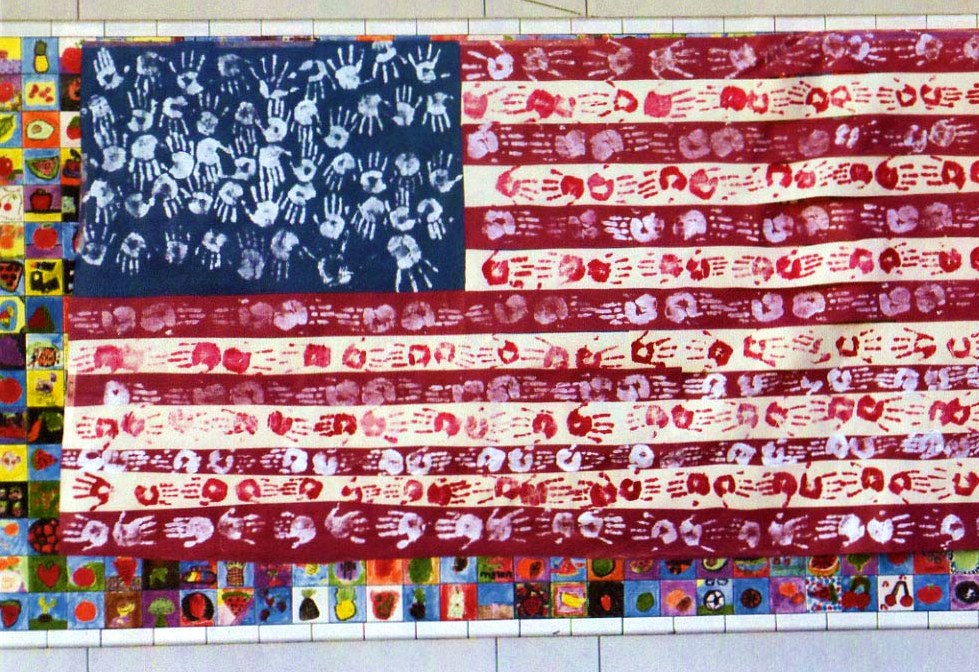
A few weeks ago, I had the honor of sitting in on a discussion, hosted by the Writers Guild of America, between First Lady Michelle Obama and the Los Angeles creative community. Along with Dr. Jill Biden, the First Lady is spreading the message that all sectors of society can "Join Forces" in honoring and supporting America's service men and women. I reflected on what role artists and educators can personally play in this effort.
Throughout history and across cultures, art has been a vehicle for both questioning and commemoration. I, like countless people before and after me, will never forget the all-consuming feelings of reverence, grief and gratitude that I felt while standing in front of Maya Lin's Vietnam Veterans Memorial. Even my children, who were just 2 and 5 at the time, soaked in the mood of quiet reflection at the wall, solemnly trailing their fingers over the names of memorialized soldiers. I've lost count of the times that an image, poem or performance has inspired a thorough overhaul of something -- some ideal or "truth" -- I thought I knew but didn't. These two quintessential functions of art, commemorating and questioning, seem to exist on opposite poles at first glance, but they are clearly part of one vital patriotic continuum.
Joining the First Lady on the stage that day, along with "Fringe"-creator J.J. Abrams and "Army Wives"-creator Katherine Fugate, was Arnita Brigman Moore, wife of Marine Staff Sergeant Moore; retired Sergeant Bobby Jarman; and Captain Kelly Smith, a National Guard Aircraft Commander. They each told their personal story of heroism, filling me and everyone in the room with a deep respect for their service, and the service of all our military personnel. In the weeks following, leading up to the Fourth of July, I learned that the theme for our P.S. ARTS summer program in Central California was going to be "Patriotic." I had also began reading the incredible biography by Li Cunxin, "Mao's Last Dancer," which delves into the complicated relationship between arts and politics. The fireworks, the perspective of an artist who deeply loved his homeland and still defected to America and the mental picture of kids in a rural migrant farming community -- nearly all the children of immigrants -- crafting iconic American images got me thinking (again, as this is a subject often on my mind and in my heart): artists have a unique gift (or burden) to tell stories and share multiple perspectives, which could influence the course of a nation. Then, watching the final launch of the space shuttle Atlantis... wow. It all bubbled over (yup, I cried) when I saw artist Stephen Bach, in the midst of the media and masses recording with every manner of technology, furiously working on two canvases to document the event.
Dr. Jessica Hoffmann Davis, the founding director of the Arts in Education program at the Harvard Graduate School of Education (and, incidentally, the most influential mentor in my professional life), included a section in her curriculum asking students to consider the "generative tension" between the role of the artist as "world mover" and "world forsaker." Of course, artists are both simultaneously. In some cases, it is the innovator, the revolutionary, who emerges as a patriot. In some cases, it is the documentarian, the commemorator, who becomes a cultural icon. From my point of view as an arts educator and patriot, there is a critical need for all Americans, especially in times of war and economic uncertainty, to learn to be both world movers and world forsakers. Our country's future development and success depends on our children's ability to celebrate and fiercely defend American ideals, while constantly questioning, and inspiring others to question, individuals' interpretations of those ideals. The arts teach us how to do both.
I witnessed a powerful illustration of that point when I watched a fifth-grade student in Lawndale, Calif. recite a Langston-Hughes-inspired poem she has written, exploring and asserting her own American identity:
I am mixed.
I may not be your race
but I deserve respect.
Racial slurs are not me.
I may not be African-American or
Hispanic, or Latino, or White.
I deserve a relationship with California.
Hardships and pain have passed
through this delicate soul
and this fragile heart has been dented.
What begins a lovely day
with friends can turn gloomy.
Sticks and stones won't break my soul.
Get out of the way. I am invincible.
I will not wait in line.
I have arrived.
I, too, live America.